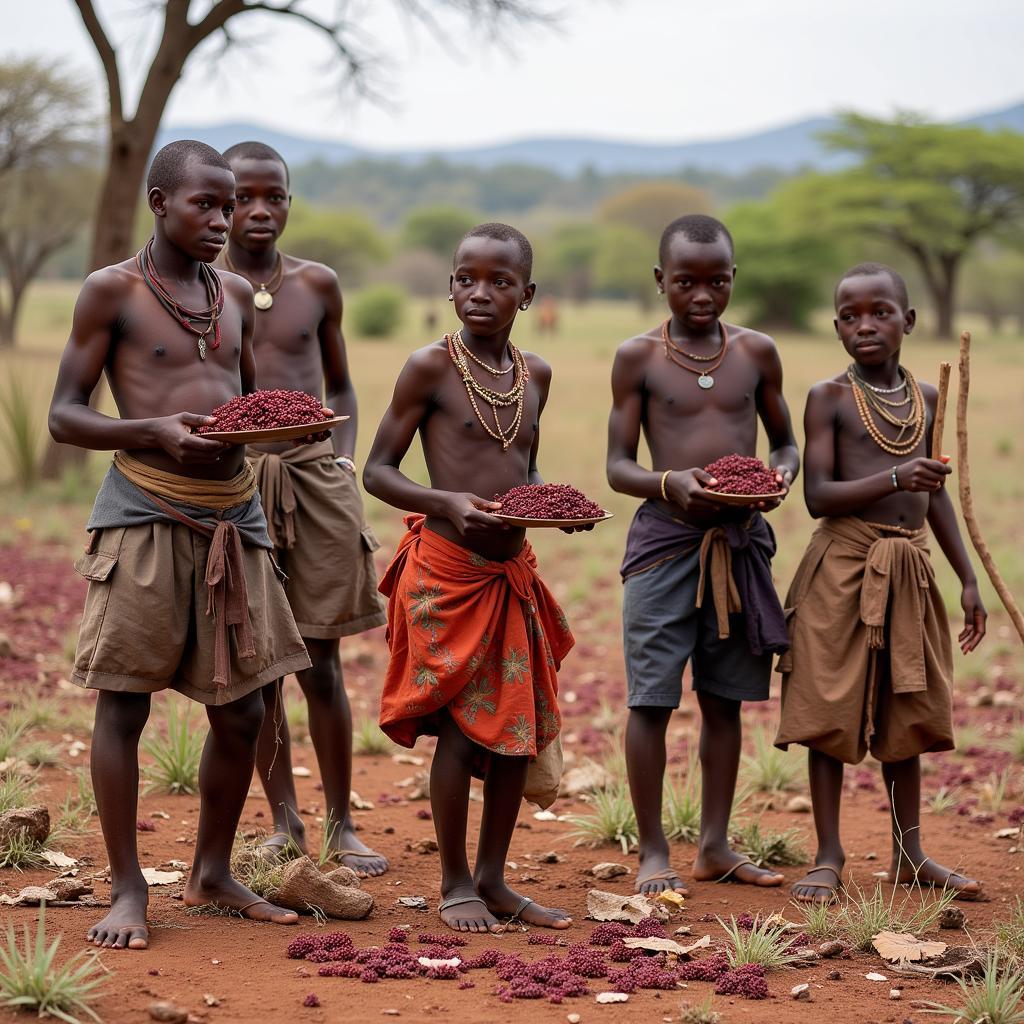Modern hunter-gatherer societies offer a unique window into a way of life drastically different from our own. These communities, though dwindling in number, continue to practice a lifestyle based on foraging for food and migrating with the seasons. They represent a vital link to our shared human past and provide valuable insights into sustainable living and conflict resolution. Studying these societies can broaden our understanding of human adaptability, resource management, and what it truly means to live in harmony with nature and each other. Learn more about the fascinating history of world societies at history of world societies.
A Glimpse into Modern Hunter-Gatherer Lifestyles
Modern hunter-gatherer societies, also known as foragers, are dispersed across the globe, from the deserts of Africa to the rainforests of South America and the Arctic tundra. Despite their varied locations, they share several key characteristics. Their subsistence relies on hunting wild animals, fishing, and gathering edible plants. These communities typically maintain a nomadic or semi-nomadic lifestyle, moving seasonally to follow resources and avoid depleting local supplies. They operate within small, close-knit groups known as bands, which often prioritize egalitarianism and shared decision-making. Such social structures foster strong social bonds and minimize conflict.
Sustainable Practices of Modern Foragers
Hunter-gatherer groups demonstrate remarkable knowledge of their environment, understanding the intricate relationships between plants, animals, and seasonal changes. They practice sustainable resource management, taking only what they need and allowing the environment time to regenerate. Their intimate connection with nature fosters a deep respect for the ecosystem they inhabit. For example, the Hadza people of Tanzania rotate their hunting and gathering areas, ensuring no single area is overexploited.
 Hadza Hunter-Gatherers in Tanzania
Hadza Hunter-Gatherers in Tanzania
Conflict Resolution in Hunter-Gatherer Societies
Modern hunter-gatherer communities have developed sophisticated mechanisms for resolving conflicts peacefully. Emphasis on cooperation and sharing within the group reduces the likelihood of disputes. Informal disputes in band societies may involve discussion and negotiation, often facilitated by respected elders. Learn more about how informal disputes in band societies may involve various peaceful methods at informal disputes in band societies may involve. Avoidance and mediation are also common strategies employed to diffuse tensions. Their focus on consensus-building and maintaining social harmony offers valuable lessons for the wider world.
Challenges Facing Modern Hunter-Gatherer Groups
While modern hunter-gatherers demonstrate remarkable resilience, they face numerous challenges in the 21st century. Encroachment from agriculturalists, industrial development, and climate change threaten their traditional territories and ways of life. Loss of land access restricts their ability to forage and hunt, disrupting their food security and cultural practices. Many groups also face pressure to assimilate into mainstream society, leading to the erosion of their unique languages and traditions.
 Challenges Faced by Modern Hunter-Gatherers
Challenges Faced by Modern Hunter-Gatherers
Lessons from the Original Affluent Society
Anthropologist Marshall Sahlins famously referred to hunter-gatherers as the “original affluent society,” arguing that their needs are easily met with minimal work, allowing for ample leisure time. Learn more about this concept by exploring Marshall Sahlins’ work on the original affluent society through our resources marshall sahlins the original affluent society and the original affluent society marshall sahlins. This perspective challenges our modern notions of affluence, which often equate material wealth with well-being. Hunter-gatherers demonstrate that a fulfilling life can be achieved with a focus on community, connection to nature, and a sustainable lifestyle. For more information on how societies function, visit functioning of society.
Conclusion: Preserving Modern Hunter-Gatherer Cultures for a Peaceful Future
Modern hunter-gatherer societies offer invaluable insights into alternative ways of living and interacting with the world. Their sustainable practices, conflict resolution mechanisms, and deep connection with nature hold crucial lessons for building a more peaceful and sustainable future for all. Protecting their rights and preserving their cultures are not just acts of conservation, but essential steps towards learning from their wisdom and enriching our understanding of what it means to be human.
FAQ
- What are the main characteristics of modern hunter-gatherer societies?
- How do hunter-gatherers manage resources sustainably?
- What methods do they use for conflict resolution?
- What are the major threats to their way of life?
- What can we learn from hunter-gatherer societies?
- How does their concept of “affluence” differ from ours?
- Why is it important to protect their cultures?
Need support? Contact us 24/7 at Phone: 02043854663, Email: [email protected] or visit us at Zone 34, Bac Giang, 260000, Vietnam.